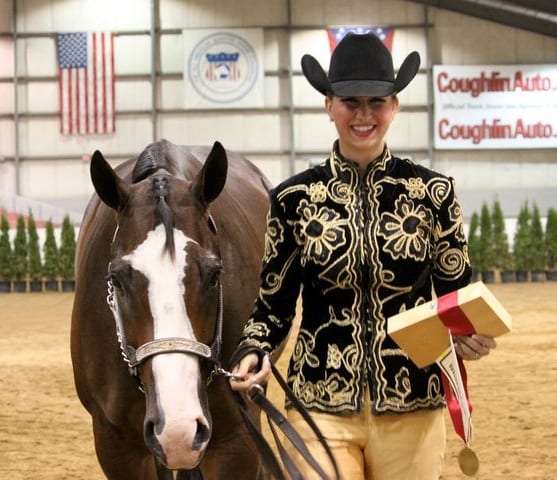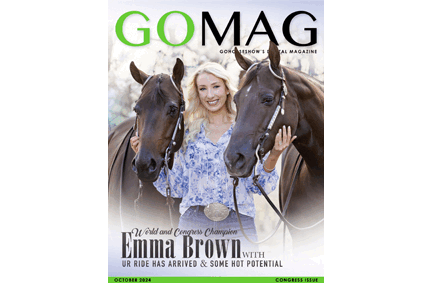With the major shows right around the corner, GoHorseShow decided to interview three leading exhibitors who have done well at the major shows. They took time out of their busy lives to provide ideas on how they avoid mental mistakes at the major shows across the country. World and Congress Youth Champion Carey Nowacek, World Champion Hunter trainer, Lainie DeBoer, and five time Amateur Super Horse winner turned trainer, Karen Evans Mundy, discuss how they have handled the pressure over the years at some of the largest shows in the country.
Texas Christian University Equestrian Coach Gary Reynolds also gave a brief summary of how he helps his team prepare for their competitions. “We really approach it three different ways: strength and conditioning–we find that being physically fit adds to being mentally fit. Our strength coaches put all the athletes including the equestrian athletes through mental toughness training,” he said. “Mental preparation–it varies from one athlete to the next, but for the most part, we walk through the patterns repeatedly. We will use cups of something and set up the pattern and visualize each step. We do the same no matter what event. If an athlete still has trouble, then we have a sports psychologist that works with them, and we have had great success with the athletes in that area.”
While most riders don’t have access to sports psychologists, there are many trainers and exhibitors that are able to find out through trial and error how to avoid making mental mistakes in the show arena.
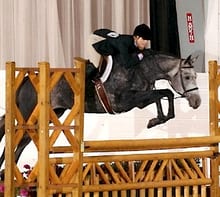 Minnesota based hunter trainer DeBoer explains that she loves the mental side of riding. “As a youth rider, I ran into a huge mental block in my riding that held me back from winning. I had a great trainer that had me read a book about mental toughness. It changed my life. If I have a customer in a mental rut–I have them read the book, The Inner Game of Tennis, by Tim Gallwey. It is about tennis but it gives you the tools to work through problems and takes learning to a new level.” (Photo © Jeff Kirkbride)
Minnesota based hunter trainer DeBoer explains that she loves the mental side of riding. “As a youth rider, I ran into a huge mental block in my riding that held me back from winning. I had a great trainer that had me read a book about mental toughness. It changed my life. If I have a customer in a mental rut–I have them read the book, The Inner Game of Tennis, by Tim Gallwey. It is about tennis but it gives you the tools to work through problems and takes learning to a new level.” (Photo © Jeff Kirkbride)
According to DeBoer, mental toughness is all about routine and ritual. “At the big shows, I try to stick to my program, keep on a routine, and if a problem arises, stay calm and think it out. I eat a good meal, wear a certain belt with my britches, wear nylons that don’t match, polish my boots, and do my hair a special way in my hat,” she explains. “As soon as I sit in my saddle, I feel calm. Some of my best rounds–it takes me a while to remember because I tune everything out.”
For Lainie’s customers, it really depends on their personalities. “If my riders draw first in the finals, I always tell them that is perfect! If you lay out a great ride, then you put the pressure on your competitors. I have had my customer’s draw first four times, and we have one each time,” she proudly says. “I always tell my customers that everyone is anxious and nervous. If you can focus and tune that out–you are ahead of everyone else. With the little kids, I have them name their butterflies. One of my kids named hers, Lucy, Ethel, and Ricky,” Lainie laughs and said. “It definitely lightened the moment.”
“Pressure is definitely a big part of the horse industry, no matter who you are or what event you are showing in, you feel some sort of pressure weighing on you,” Nowacek told GoHorseShow.com. “For me, I felt a ton of pressure throughout my youth career and even more so in my final year.”
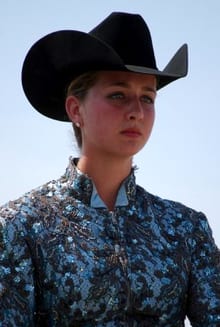 When Nowacek was younger, she said she learned a great deal from her trainer Brad Jewett about trusting in her horse, her trainer, and mainly herself. Carrie said she had several mental blocks when she was growing up showing. “I would get really worked up and mad at myself when I continually could not figure something out. When I was younger it was bad because I would just shut down and then my brain would be fried. I learned quickly that when I get in a place like that I need to stop, relax and just take some time to myself to figure out how I can get back to work in a positive way before I getting in a huge fight with my horse and sometimes even Brad.”
When Nowacek was younger, she said she learned a great deal from her trainer Brad Jewett about trusting in her horse, her trainer, and mainly herself. Carrie said she had several mental blocks when she was growing up showing. “I would get really worked up and mad at myself when I continually could not figure something out. When I was younger it was bad because I would just shut down and then my brain would be fried. I learned quickly that when I get in a place like that I need to stop, relax and just take some time to myself to figure out how I can get back to work in a positive way before I getting in a huge fight with my horse and sometimes even Brad.”
Nowacek explains that before she shows she may look like she’s not getting prepared, but she is taking time to relax and collect her thoughts before she goes in and shows. “There is really nothing more you can do in the five minutes before you show except make sure your horse is tuned into you, so I like to relax. It’s my way of staying calm and keeping my horse mentally relaxed also. I feel like right before you show there should be some time where you are walking around on a loose rein doing just that.”
Carrie adds, “The more I would hammer on my horse and try and get some quick fixes in right before I was supposed to walk into the pen, I feel like the worse I showed. I feel like at bigger shows I try to stay more out of my horses way, where at smaller shows I know I can be a little harder on him in practice and before I go in. It’s the way you handle the pressure that decides the outcome of success or failure.”
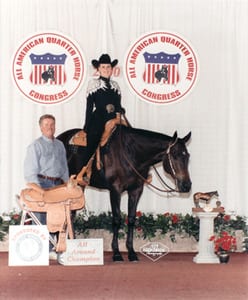 Five-time Super Horse winner Karen Evans Mundy turned trainer has probably been in the hot seat and under more pressure than most exhibitors will ever experience in their lifetime. Mundy explains that she believes that it is key to not changing anything at the major shows. “I say whatever we are doing was good enough to get us here, so we go with what we have. After the show, I will then go home and start working on changes. It will only confuse you and your horse and that will also mess with your mental focus. Just stick with the routine that you do day in and day out at every other show.” (Photo © Jeff Kirkbride)
Five-time Super Horse winner Karen Evans Mundy turned trainer has probably been in the hot seat and under more pressure than most exhibitors will ever experience in their lifetime. Mundy explains that she believes that it is key to not changing anything at the major shows. “I say whatever we are doing was good enough to get us here, so we go with what we have. After the show, I will then go home and start working on changes. It will only confuse you and your horse and that will also mess with your mental focus. Just stick with the routine that you do day in and day out at every other show.” (Photo © Jeff Kirkbride)
When Mundy competed at the Congress and the World, she said that she did a lot of self-talking to herself. “I have heard many people say, ‘oh my gosh, so in so is here.’ or ‘I don’t want to mess up because there are so many people watching in the stands.’ I think that it the worst thing you can possibly think. Without being ignorant, when I felt my mind start to think about how many good riders and horses were at the show….I told myself, ‘I’m just as good as anyone here, and I deserve to be here just as much as anyone.’ That is just a way of self talking to my self in a positive way.”
Mundy continues, “And I never worried about who was watching, I really didn’t care. When I stepped into that ring, I only knew it was me and my horse, and I was trying to have the most perfect ride. One thing I heard many years ago from the famous gymnast coach, Bela Karolyi. He taught the girls—Go over in your mind your routine and seeing yourself do it perfect. I learned that is a great mental thing to do. I rode every step in my mind, jumping every jump, and did every maneuver in a pattern, exactly how I wanted it to be…perfect!”
Another thing Mundy mentions is that she tried to not talk to anyone before she went in the arena–just so she could have total focus. “Having the stress and learning how to channel it in a positive way is the key. However, there was times that I ‘bombed.’ It was very hard on me when that happened, but my favorite saying is, ‘A winner never quits, and a quitter never wins.’ So, I just remind myself–there is another World Show next year.”


